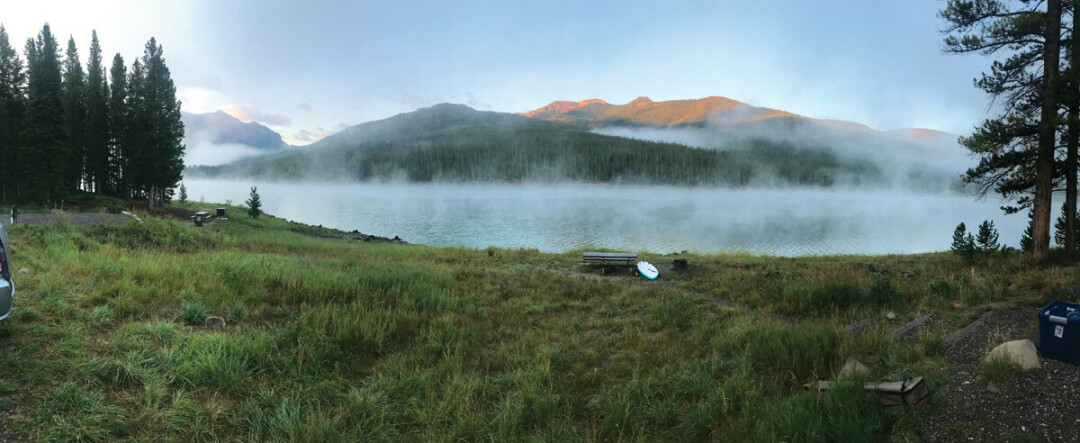Chasing Fins at Hyalite Canyon
Christopher Dyrland-Marquis, photos by Brian Ripple | Wednesday Sep. 1st, 2021

In the early morning light that grew on Hyalite Reservoir, a soft breeze rippled above its low waves and settled—slowly intertwining around the evergreens that peppered the water’s edge. I felt the green, Old Town canoe that I relaxed in begin to dip up and down in the undulating water, and I started to paddle against wind that pushed me towards the southeastern shore. Bumping aside my tackle box with a hollow thump, I leaned my fishing rod against the boat’s edge, and let the line trail behind me in the slow wake my movements had created.
The trees sighed gently amongst themselves as I maneuvered, and I heard the occasional croak of a raven floating somewhere above me. Very quietly in the background, I could just make out the soft whispers of a small spring that bubbled down from within the woods, and poured into the surrounding water. Sitting in that canoe, at that moment, I wasn’t sure that I was only thirty minutes away from Bozeman. In that picturesque moment, I was convinced I had stepped into an oil painting, with Palisade Mountain rising stately and sublime to my left. It caught the early morning sun and brilliantly contrasted the dark, shadowed valley that surrounded it and stretched away to the south.
We live in a beautiful place, offering spectacular opportunities to appreciate the breathtaking vistas that surround us and take part in responsible symbiosis with our local landscapes. One of the best methods I have found to take advantage of this relationship is through the expansive and rewarding art of fishing! If you have done so before, you will know what I mean. Few pleasures rival the exhilaration of catching a fish only from a bit of wits and a worm (and some luck if we’re honest), and there are few activities that allow for a deeper connection with the land around you. Fishing brings us into the unique position to both do something and nothing: we sit, we reel, and we wait, finding ways to entertain ourselves in our relaxation. And then, the fish bites and all that peace leaves us in favor of our excitement, giddy shouts, and white-knuckle grips to catch the thrashing foe we’ve ensnared!
I began my adventure by setting a day beforehand to prepare for the trip as well as I could, and orchestrate it into the symphony of fins and splashing water I knew it could be. In all honesty, a lot of preparation goes a long way towards turning a fishing trip into a relaxing experience. Far too often, while spontaneous fishing can be quite fun, you always forget something: that thermos of coffee you wanted to take along, maybe your favorite lure, sometimes even your wife if you’re unlucky...things happen. An excited mind is easy to distract! For any newcomers, a bit of planning goes a long way.
Above all else, if you are going to go fishing, ensure that you are licensed to do so. Not only do the proceeds of your fishing license support the very necessary practice of outdoor conservation, you will not be abiding by law without one. Poaching is a serious crime, and if you are caught fishing without a license, you can expect fairly dire consequences. Plus, licenses are extremely easy to get: nearly every sporting goods store offers fishing licenses to walk-ins, and the process usually takes no more than fifteen minutes. Certainly, buying a license is a bargain compared to the costs of unpleasant alternatives.
Once properly licensed, you need to decide whether you enjoy being dry, but catching mostly no fish, or getting a little wet, and unfortunately, still catching mostly zilch. Most fishermen spend years of their lives cursing the murky depths where they are all but certain that fish mock their crude attempts to woo them, and the choice usually falls between doing it in a boat or on land. Personally, I find that my seasickness overcomes my frustrations, and I can put aside my trout-fueled quarrels to firmly grip the boat’s gunwales.
It’s also important to consider how long you will pursue the fish you wish to catch. Novice fishermen often last for hours, angrily chewing beef jerky into gum, and drowning their sorrows in bottles of sun-scorched root beer. Veterans on the other hand, seldom without the patience and wisdom from experience, understand the affair is hopeless from the start, and might give it a go for a good fifteen minutes before conceding into a relaxing nap. Regardless, deciding how long you want to fish helps to know what supplies to bring along: what amount of food and drink you wish to take to make the trip worthwhile and any appropriate amount of clothes to account for weather.
As I began my trip into the nearby mountains to try my hand and test my mettle, I decided to fish by boat. The night before I departed, I strapped my canoe onto the roof of my truck, and stowed a life-jacket and paddle in its cab. Though I didn’t think I might need it, I also packed along a whistle, emergency radio, and space blanket. While it can be tempting to set out onto a body of water with only a paddle and the mindset you acquired after watching the movie Deliverance, doing so is extremely unwise. Open water is incredibly unpredictable, and if anything were to go wrong, you would most certainly wish that of all the chaotic problems you’d need to solve in that moment, the basic necessity of floating was not among them. Boats overturn all the time. People drown all the time. If you choose to fish in a boat, give yourself every possible chance by wearing a life-jacket and holding on to a few basic pieces of equipment (It just so happens to also be against the law to boat without a life-jacket on board for every soul).
Once I had packed everything I needed for my basic fishing day-trip, I climbed into my dutiful Chevrolet, and drove south out of town, eventually turning left onto Hyalite Canyon Road. This particular road is also important to note, because it tends to undergo extreme transformations throughout the year. In the summer, the drive is scenic, shaded, and quite pleasant—the steady ascent is accompanied by tall, swaying pine trees that keep the minty air cool and fragrant. Waist-high grasses sway along both sides of the single-lane highway, and a relaxed atmosphere tends to settle on the traffic passing by as they cruise around various rock outcroppings and overlooks. However, as snow begins to fall, the road changes for the worse.
I’ve heard winter driving on Hyalite Canyon Road best described by its trauma-shaken witnesses as, “Sleddin’ uphill, and like a cart on tracks.” There really isn’t much steering: compacted ice from a continuous convoy of winter traffic provides some of the only paths to follow, and when the weather warms for a few bright afternoons, deep troughs plowed by traffic create slippery hills of ice that catch vehicles’ tires and cause them to drift, sway, and spill across their lanes. It is never uncommon to see a 4-wheel-drive vehicle stuck along the side of the road in a snow berm, and it’s absolutely essential to drive under the road’s 35 mph speed limit.
In the spring, water seeps into shelves of stone outcroppings that crumble and drop large rocks across the highway. Though the road is closed for part of the year to combat accidents, this erosion can still take place once it opens back up. I suppose what I’m saying is that, if you don’t identify as a diehard Hyalite recreationalist, the summer is the best time to introduce yourself to fishing. Go when the conditions allow, and you will certainly avoid any trouble!
The next leg of my journey began once I arrived at the majestic sight that Hyalite greets travelers with when they draw close to the reservoir’s day-use area. The tunnel of evergreens drifts apart from itself, and the sky opens up into a majestic hue that fades into distant blue-greens, as wooded ridges across the sparkling waterfall distant and sprawling. Shelves of rugged stone tower over the canyon, and stretch in such steepness that bare rock is exposed where no trees have been able to find purchase. While the canyon is host to a campground and day-use area, the latter is most welcoming towards what the name implies: a casual visit or afternoon excursion. It’s possible to camp on the northeastern side of the reservoir and stay longer, but reservations would need to be made for the Hood Creek Campground at www.recreation.gov.
Finally, once I arrived, I was able to enjoy the fruits of my labor! I excitedly carried my canoe down the cement boat landing, and slowly pushed it into the cold water, climbing in and pulling both my fishing rod and tackle with me. In slow, glorious strokes I pushed myself away from the shore into deeper water, unable to contain my smile. I don’t think anyone would be able to. Crisp air quickly numbed the tip of my nose as I took in the epic upthrusts of stone around me, and I baited my line with a simple gas station worm before dropping it with a plop into the water.
If I ended my story here, you would most likely assume that I went on to have an incredible day full of thrashing sea monsters! Yet, I never caught a single fish. I may have been too enamored with the beauty surrounding me to take it seriously. Or, maybe I used the wrong bait. It’s possible that I made too much noise as I munched away on my GORP (Good Ol’ Raisins and Peanuts for all those uninitiated). But, many people argue that there is no such thing as a bad day of fishing, and I would tend to agree: I relaxed, I paddled, and for a moment I even thought about swimming (before I dipped my hand in the water and swore that I touched an iceberg). With no fish to show for it, I still drove home smiling at the end of the day and still created memories I will cherish forever, and that’s the whole point of fishing in the first place.
Should you feel inclined to try your own hand at the beautiful art of fishing, do it! Absolutely! You will never encounter better food for the soul, and you might even achieve the impossible: catching actual food for the body! Regardless, the time you spend appreciating the land around you will create experiences you can savor for years to come and help bring you closer to the land you live on. If you have any questions about fishing licenses or regulations, please visit https://fwp.mt.gov/fish for more information.
| Tweet |

